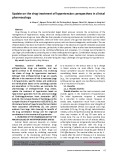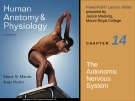
Sympathetic nervous system
-
Drug therapy to achieve the recommended target blood pressure remains the cornerstone of the management of hypertension. Today, there are strong evidences from randomized controlled trials that antihypertensive drugs are more effective than placebo at reducing cardiovascular mortality and morbidity.
 8p
8p  vifaye
vifaye
 20-09-2024
20-09-2024
 3
3
 1
1
 Download
Download
-
Chapter 14 provides knowledge of the autonomic nervous system. In this chapter, you will learn to: Define autonomic nervous system and explain its relationship to the peripheral nervous system; compare the somatic and autonomic nervous systems relative to effectors, efferent pathways, and neurotransmitters released; compare and contrast the functions of the parasympathetic and sympathetic divisions;...
 60p
60p  tangtuy07
tangtuy07
 02-04-2016
02-04-2016
 47
47
 3
3
 Download
Download
-
Most evidence suggests that the major efferent limb of the inflammatory reflex is carried in: A. The sympathetic chain B. The phrenic nerve C. The vagus nerve D. Postganglionic sympathetics arising in the stellate ganglia E. The long thoracic nerve Correct Answer: The correct answer is C. Evidence suggests that information leaving the central nervous system regarding regulation of inflammation is carried mainly in the vagus nerve. The sympathetic chain is the origin of postganglionic fibers for sympathetic innervation of visceral organs.
 190p
190p  ozon_ozon
ozon_ozon
 03-05-2012
03-05-2012
 58
58
 4
4
 Download
Download
-
Neurogenic shock is shock caused by the sudden loss of the autonomic nervous system signals to the smooth muscle in vessel walls. This can result from severe central nervous system (brain and spinal cord) damage. With the sudden loss of background sympathetic stimulation, the vessels suddenly relax resulting in a sudden decrease in peripheral vascular resistance (vasodilatation) and decreased blood pressure.
 4p
4p  truongthiuyen1
truongthiuyen1
 09-06-2011
09-06-2011
 61
61
 3
3
 Download
Download
-
Physiology of the Female Sexual Response The female sexual response requires the presence of estrogens. A role for androgens is also likely but less well-established. In the CNS, estrogens and androgens work synergistically to enhance sexual arousal and response. A number of studies report enhanced libido in women during preovulatory phases of the menstrual cycle, suggesting that hormones involved in the ovulatory surge (e.g., estrogens) increase desire. Sexual motivation is heavily influenced by context, including the environment and partner factors.
 5p
5p  ongxaemnumber1
ongxaemnumber1
 29-11-2010
29-11-2010
 98
98
 6
6
 Download
Download
-
Disorders of Vascular Tone or Blood Volume Disorders of vascular tone or blood volume that can cause syncope include the reflex syncopes and a number of conditions resulting in orthostatic intolerance. The reflex syncopes—including neurocardiogenic syncope, situational syncope, and carotid sinus hypersensitivity—share common autonomic nervous system pathophysiologic mechanisms: a cardioinhibitory component (e.g., bradycardia due to increased vagal activity), a vasodepressor component (e.g., inappropriate vasodilatation due to sympathetic withdrawal), or both.
 5p
5p  ongxaemnumber1
ongxaemnumber1
 29-11-2010
29-11-2010
 60
60
 2
2
 Download
Download
-
Drugs Acting on the Sympathetic Nervous System of the sympathetic division can be considered a means by which the body achieves a state of maximal work capacity as required in fight or flight situations. In both cases, there is a need for vigorous activity of skeletal musculature. To ensure adequate supply of oxygen and nutrients, blood flow in skeletal muscle is increased; cardiac rate and contractility are enhanced, resulting in a larger blood volume being pumped into the circulation. Narrowing of splanchnic blood vessels diverts blood into vascular beds in muscle.
 29p
29p  bigbaby87
bigbaby87
 04-09-2010
04-09-2010
 171
171
 16
16
 Download
Download
CHỦ ĐỀ BẠN MUỐN TÌM



















